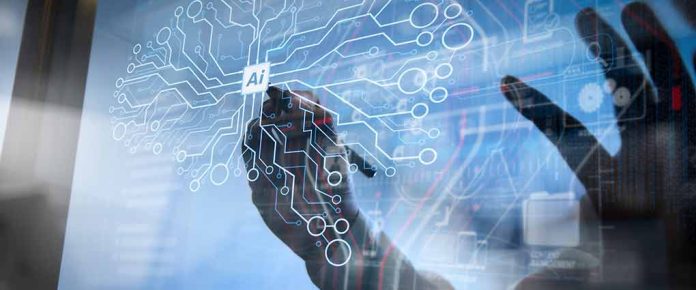
AI giants Anthropic and Meta secured major legal victories against authors in landmark copyright cases, potentially setting the stage for unfettered use of books to train powerful AI systems without compensating creators.
Key Takeaways
- Federal Judge William Alsup ruled Anthropic’s use of legally purchased books for AI training is “quintessentially transformative” and protected under fair use doctrine.
- Judge Vince Chhabria dismissed a similar case against Meta, citing insufficient evidence that authors’ economic rights were harmed.
- Despite the fair use ruling, Anthropic still faces a December trial over downloading millions of pirated books for their “central library.”
- These rulings represent significant wins for AI companies against content creators seeking compensation for use of their intellectual property.
- U.S. copyright law allows for statutory damages up to $150,000 per work for willful infringement, creating potential financial exposure for AI companies.
Court Rules AI Training with Books is “Transformative”
In a decision that will reshape the landscape of AI development, U.S. District Judge William Alsup ruled that Anthropic’s use of books to train its AI model Claude constitutes “fair use” under copyright law. The ruling, delivered in a San Francisco federal court, determined that using copyrighted literary works to develop large language models creates something fundamentally different from the original works. This judgment represents a significant victory for AI companies that rely heavily on existing content to build their systems.
“The purpose and character of using copyrighted works to train LLMs to generate new text was quintessentially transformative,” Alsup wrote. “Like any reader aspiring to be a writer,” said U.S. District Judge William Alsup
The lawsuit was filed by authors Andrea Bartz, Charles Graeber, and Kirk Wallace Johnson, who claimed Anthropic had infringed on their copyrights by using their books to train Claude. However, Judge Alsup found that AI models do not replicate creative elements or an author’s expressive style, but rather create entirely new content. This distinction was crucial to his determination that such usage falls under fair use protection, dealing a significant blow to creators seeking compensation for AI training data.
Meta Wins Dismissal in Separate Case
In a parallel case, U.S. District Judge Vince Chhabria ruled in favor of Meta, dismissing copyright claims from authors regarding the company’s AI training methods. The judge determined that the plaintiffs failed to provide sufficient evidence that Meta’s use of their works caused market dilution or economic harm. However, Chhabria was careful to note that his ruling did not broadly legitimize Meta’s practices, but rather addressed the specific legal arguments presented in this case.
A federal judge ruled that an artificial intelligence company did not break the law when it used copyrighted books to train its chatbot without the consent of the authors or publishers — but ordered it must go to trial for allegedly using pirated books. https://t.co/VyJmb8P1Up
— The Washington Post (@washingtonpost) June 25, 2025
“This ruling does not stand for the proposition that Meta’s use of copyrighted materials to train its language models is lawful,” Chhabria said, according to Reuters. “It stands only for the proposition that these plaintiffs made the wrong arguments and failed to develop a record in support of the right one,” said Chhabria
Despite this victory for Meta, Judge Chhabria acknowledged the broader concerns about AI’s impact on content creators. He expressed concerns that AI models trained on copyrighted works could ultimately undermine the market for human-created content, suggesting that future cases with different legal approaches might yield different results. This leaves the door open for more litigation as authors and publishers refine their legal strategies to protect their intellectual property rights.
Pirated Books Still Pose Legal Risk
While Anthropic scored a victory on the fair use front, the company still faces serious legal trouble over its alleged downloading of approximately 7 million pirated books. Judge Alsup ordered a trial, scheduled for December, to determine how these pirated materials were used and assess potential damages. This separate issue highlights the complex legal terrain AI companies must navigate as they build training datasets while balancing intellectual property concerns.
“That Anthropic later bought a copy of a book it earlier stole off the internet will not absolve it of liability for the theft, but it may affect the extent of statutory damages,” said U.S. District Judge William Alsup
According to court documents, Anthropic employees expressed concerns about using pirate sites for content acquisition, eventually leading to a change in approach. However, this initial collection of unauthorized content could prove costly, as U.S. copyright law allows for statutory damages of up to $150,000 per work for willful infringement. With millions of books potentially involved, the financial exposure could be substantial despite the company’s win on the fair use question.
Implications for the Future of AI and Creative Works
These rulings begin to establish legal boundaries for the rapidly evolving AI industry, particularly regarding the contentious issue of training data. As AI companies like Anthropic, OpenAI, and Meta continue developing increasingly sophisticated models, the tension between technological innovation and creative rights remains unresolved. Some media companies have opted to seek licensing agreements with AI developers, while others pursue legal action to assert their rights and secure compensation.
“We are pleased that the Court recognized that using ‘works to train LLMs (language learning models) was transformative, spectacularly so,” said Anthropic spokesperson
President Trump’s administration faces increasing pressure to develop clearer policies around AI development and intellectual property rights. These court decisions will likely accelerate calls for legislative action to address the fundamental question of whether content creators deserve compensation when their works are used to train AI systems. Until Congress acts, the courts will continue shaping this critical intersection of technology and creative rights through case-by-case determinations that could have far-reaching consequences for both industries.














